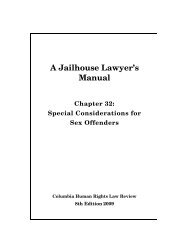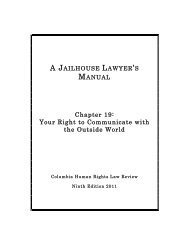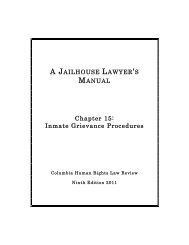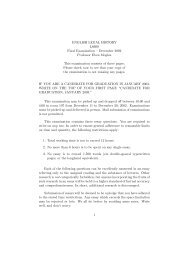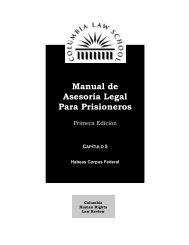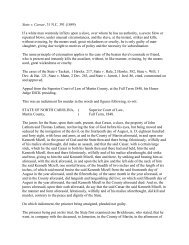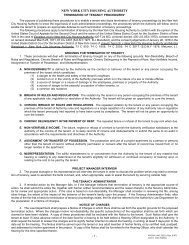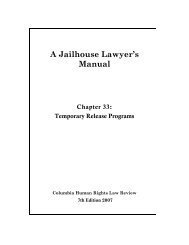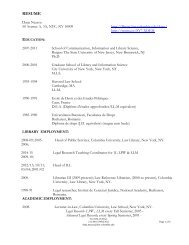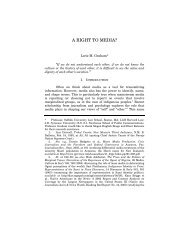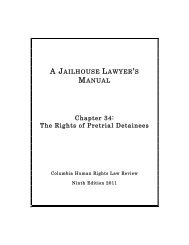The Right to Dignity Rex D. Glensy - Columbia Law School
The Right to Dignity Rex D. Glensy - Columbia Law School
The Right to Dignity Rex D. Glensy - Columbia Law School
Create successful ePaper yourself
Turn your PDF publications into a flip-book with our unique Google optimized e-Paper software.
124 COLUMBIA HUMAN RIGHTS LAW REVIEW [43:65<br />
remain available” under those circumstances. 267 <strong>The</strong> Court hinged its<br />
opinion on the notion that awareness of one’s own surroundings was a<br />
necessary component <strong>to</strong> humane punishment and that the absence of<br />
this component negated an individual’s dignitary interest. According<br />
<strong>to</strong> the Court, “a cruel punishment is one that treats the offender as<br />
though he or she were not a human person with a claim <strong>to</strong> our<br />
concern as fellow persons, but as a mere animal or thing lacking in<br />
basic human dignity.” 268<br />
<strong>The</strong> Court has similarly deployed dignity as a background<br />
norm in cases presenting other issues. As described in detail above,<br />
prisoner treatment cases exhibit much of the positive rights approach<br />
but also include a significant negative component that has dignity as<br />
its motivating seed. 269 Search and seizure law also follows this<br />
example. 270 Similarly, “the constitutional foundation underlying the<br />
privilege [against selfincrimination embodied by the Fifth<br />
Amendment] is the respect a government—state or federal—must<br />
accord <strong>to</strong> the dignity . . . of its citizens.” 271 Further, physical<br />
intimidation is not necessary <strong>to</strong> trigger a constitutional violation<br />
because nonphysical threats are “equally destructive of human<br />
dignity.” 272 Straying from the Miranda approach <strong>to</strong> the Fifth<br />
Amendment “can only lead <strong>to</strong> mischievous abuse of the dignity the<br />
Fifth Amendment commands the Government afford its citizens.” 273<br />
In other words, the ultimate guardian against abuse by the<br />
government, with which the government cannot interfere, is the right<br />
<strong>to</strong> dignity. 274<br />
267. See Richard J. Bonnie, Panetti v. Quarterman: Mental Illness, the<br />
Death Penalty, and Human <strong>Dignity</strong>, 5 Ohio St. J. Crim. L. 257, 277 (2007–2008).<br />
268. John F. Stinneford, Incapacitation Through Maiming: Chemical<br />
Castration, the Eighth Amendment, and the Denial of Human <strong>Dignity</strong>, 3 U. St.<br />
Thomas L.J. 559, 566 (2006).<br />
269. See e.g., Johnson v. Avery, 393 U.S. 483, 485 (1969) (pertaining <strong>to</strong> a<br />
prisoner’s right <strong>to</strong> access the courts); Pell v. Procunier, 417 U.S. 817, 822 (1974)<br />
(right <strong>to</strong> free speech); Cruz v. Be<strong>to</strong>, 405 U.S. 319, 322 (1972) (right <strong>to</strong> worship).<br />
270. See Mapp v. Ohio, 367 U.S. 643, 655–57 (1961).<br />
271. Miranda v. Arizona, 384 U.S. 436, 460 (1966).<br />
272. Id. at 457.<br />
273. Doe v. United States, 487 U.S. 201, 219 n.1 (1988).<br />
274. Similarly, racial discrimination has been characterized as a<br />
deprivation of personal dignity and thus a violation of the Equal Protection<br />
Clause. See Heart of Atlanta Motel v. United States, 379 U.S. 241, 291–92 (1965)<br />
(Goldberg, J., concurring). Gender discrimination has as well because the inherent<br />
stereotyping involved denigrates the individual’s dignity. See J.E.B. v. Alabama,<br />
511 U.S. 127, 142 (1994) (holding that striking potential jurors on the basis of<br />
gender was an unconstitutional violation of the Equal Protection Clause).



